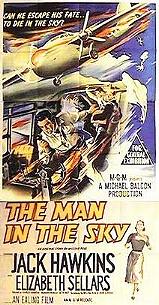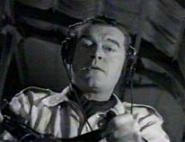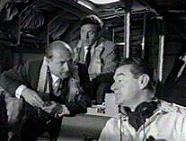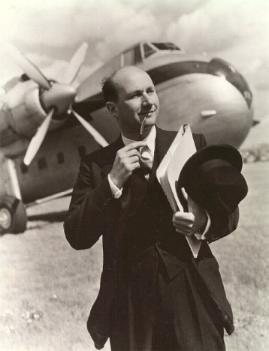Jack Hawkins
(John Mitchell)
Elizabeth
Sellars
(Mary Mitchell)
Walter Fitzgerald
(Conway)
Eddie Byrne
(Ashmore)
John Stratton
(Peter
Hook)
Victor Maddern
(Joe
Biggs)
Lionel Jeffries
(Keith)
Donald Pleasence
(Crabtree)
Catherine
Lacey
(Mary's Mother)
Megs Jenkins
(Mrs.
Snowden)
Director:
Charles
Crichton
Screenplay:
William
Rose and John Eldridge
Based on a
story by:
William
Rose
Producer:
Michael
Balcon
British Academy of Film and Television Arts Awards
---Best Screenplay (nomination received by William Rose and John Eldridge)
Hawkins is effective as test pilot giving all to save troubled craft for boss and to protect job future.
---LEONARD MALTIN'S MOVIE & VIDEO GUIDE
This story is fairly suspenseful, but not nearly enough to hold real interest.
---MOTION PICTURE GUIDE ANNUAL
BRITMOVIE--The Man in the Sky: Synopsis and photos at this British film resource.
THE INTERNET MOVIE DATABASE: Cast and crew information is available at this popular film database.


To call The Man in the
Sky, now showing at the Empire Cinema, which has an original
story by Mr. William Rose, is produced by Sir Michael Balcon
and directed by Mr. Charles Crichton, a film about a test pilot
would be correct enough in the literal sense but nevertheless
wildly misleading. Films about test pilots conjure up visions
of goggled figures bursting sound barriers in the stratosphere,
but it is improbable that the sound barrier ever received even
the slightest of dents from  any
action on the part of John Mitchell. John tests freighters for
a small and struggling company. He lives with his wife and two
small children at Wolverhampton.
any
action on the part of John Mitchell. John tests freighters for
a small and struggling company. He lives with his wife and two
small children at Wolverhampton.
One day it is John's duty to take two important passengers, one a buyer (Mr. Eddie Byrne) on whose decision the future of the firm depends, on a flight in a prototype freighter. The port engine catches fire, and he orders everyone to bale out. He stays with his ship, for there is a chance in a hundred that, if he can fly round for half an hour and exhaust the petrol in the starboard tank, he may land the plane safely -- the fire is put out and the technical details are complicated but adequately explained. It then happens that time in the film and time for the audience coincide -- and would that the unities in the cinema were more regarded and that this kind of thing happened more often.
Half an hour, then, for the
man in the sky and half an hour for the crowds on the ground
and for the audience watching him, and Mr. Crichton, by cutting
from the plane to the control tower and back again and sketching
in the Wolverhampton background, manages not to make it seem
as long to us as it must have seemed to him. But, able as this
long sequence is, The Man in the Sky reaches its
full stature only when the conventional film would consider that,
by bringing the plane safely down, it had done enough. John walks
away like a man in a dream and  nothing
Mr. Jack Hawkins does is better than the impression he gives
of complete mental, physical, and emotional exhaustion.
nothing
Mr. Jack Hawkins does is better than the impression he gives
of complete mental, physical, and emotional exhaustion.
He drives home to his semi-detached house (stopping to pick up the laundry on the way) but his wife, Mary (Miss Elizabeth Sellars), has been told by a busy-body neighbour of her husband's danger and has been at the airfield to see the nerve-racking moment of the landing. She is home before him, however, and he does not know that she knows what she does. The talk is of trivial things, and then Mary breaks into a bitter and hysterical attack on her husband for his foolhardiness in risking his life; John, bewildered and beaten, has for a moment nothing to say, and then Mr. Hawkins gathers himself for a come-back and magnificent it is, the defense of a man who has done what he considered to be his duty, and, against the misleading conventions of the cinema, is not in a mood to minimize the dangers. Psychologically, the scene is right and it is perfectly acted by Mr. Hawkins and Miss Sellars, Miss Sellars opposing silence speaking eloquently of love to vehemence born of strain and an intolerable sense of grievance.
Wolverhampton and the minor characters are firmly established, and Mr. Walter Fitzgerald, as the boss of the firm and John's friend, Mr. Victor Maddern and Mr. John Stratton deserve special mention. It is good to see the Ealing insignia on the screen again.
From the January 28, 1957
edition of THE
TIMES.
Review © 1957 THE
TIMES. All Rights Reserved.

[Photo courtesy of Tim Murphy]

[Photo courtesy of Tim Murphy]
METRO-GOLDWYN-MAYER. All Rights Reserved.

[ FILMS | HOME ]